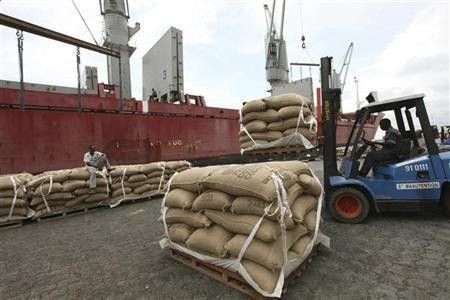Bollore has big plans for Abidjan container port

Bollore plans to invest 18 billion CFA francs in Abidjan port by 2013 to make it the region's key sea hub, the French logistics and transport group's Africa chief said.
Longer term, Bollore aims to nearly treble the existing 550,000 TEU (20-foot equivalent unit) capacity of the container port, and overhaul rolling stock and tracks leading through Ivory Coast north into neighbouring Burkina Faso.
Our aim is to make Abidjan port the key sea gateway for the countries of the hinterland, Dominique Lafont told Reuters in an interview.
Nearly half the cocoa supplies of the world's largest grower pass through Abidjan, which is vying with Lome in Togo, Cotonou in Benin, Dakar's Senegal, Nigeria's Lagos and Tema in Ghana for traffic on Africa's increasingly busy western seaboard.
Civil engineering work to expand Abidjan's capacity was launched in 2010 but halted earlier this year when an election dispute triggered a conflict in which 3,000 died and which brought the economy to a near standstill. The crisis ended when former leader Laurent Gbagbo was ousted from power in April.
While Bollore also operates container ports in Cameroon, Ghana and Nigeria among others, the investment plan is a vote of confidence in President Alassane Ouattara's aim to turn Ivory Coast into an emerging market economy in a decade.
We think Ivory Coast should be able to regain its economic and political leadership role in West Africa ... We are very optimistic about its ability to bounce back, given the resolve of its leadership and the support of the international community, Lafont said.
The International Monetary Fund estimates Ivory Coast's economy will have shrunk 5.8 percent in 2011 as a result of the four-month crisis, and will bounce back by 8.5 percent in 2012.
Bollore's initial 18-billion CFA investment is aimed at increasing capacity by 30 percent by 2013. Lafont gave no target date for subsequent expansions that would see capacity rise to 1.5 million TEU.
Aside from the port, Lafont said Bollore was ready to invest a further 60 billion CFA over 10-15 years in rolling stock and 170 billion in track maintenance for the existing rail line to Burkina Faso.
A further five billion CFA was earmarked for investment in Abdijan's shipyard and a separate project for an electric bus service for its estimated four million residents.
For Africa as a whole, Lafont said Bollore was targeting annual investment of 200-300 million euros, a figure set to increase in line with perceived improvements in governance and democracy on the continent.
Increasingly, we are seeing elections that result in genuine transfers of power, said Lafont. Our sense is one of growing push for efficiency by Africa's governments.
© Copyright Thomson Reuters {{Year}}. All rights reserved.





















